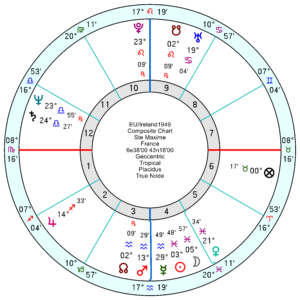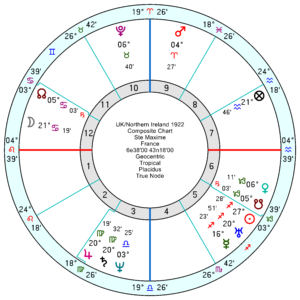Untying the Gordian knot of the Ireland problem is where the majority of Brexit attention is being focussed. Though heaven knows there are multifarious other worries about customs borders and future trade requiring preparation which appear to be sliding under the radar.
As far as Ireland is concerned, Leo Varadakar, the Irish leader, is in Brussels this week to meet Juncker et co to discuss a possible no-deal Brexit and how to tackle Theresa May’s request for a renegotiation.
The relationship chart between the Republic of Ireland (18 April 1949 midnight Dublin) and the EU is oddly the one showing the most strain over the next three years. It has a composite New Moon so is a significant bond; but is also strained with a composite Yod of Saturn Neptune sextile Pluto inconjunct Venus. Considerable confusion is showing between the two from March 29th this year onwards till late 2020 as tr Pluto squares the Neptune; with more discouraging pressure in 2020/2021 as tr Pluto squares Saturn; and it will be sagging with disappointment in 2021/22 with tr Neptune conjunct the apex Venus.
The relationship chart between the UK and Ireland 1949 is very chained together at the best of times which produces a good deal of resentment, with a composite Saturn opposition Mercury square Pluto. It’s in for a considerable jolt from late March to mid April with tr Uranus is an irritable and insecure conjunction to the composite Mars and in a highly-strung opposition to Neptune Jupiter. Thereafter there’s not much major movement until 2021 when there’s more sign of a rupture or change in relations with tr Uranus square the composite Uranus.
Varadakar looks fairly relieved around the late March/early April phase.
The relationship between Northern Ireland, 7th December 1922 3.28pm, and the EU is due for a major jolt come July 2019; and a larger upheaval in 2021 – with tr Uranus square the composite Pluto first, then tr Pluto trine the composite Uranus respectively.
The UK/Northern Ireland relationship will also alter radically come July of this year, on and off into early 2020; and will sag badly in 2020 with tr Neptune opposition the composite Jupiter Saturn and square Uranus.
I’d hazard a guess there will be some sort of fudge pushing matters back three months, then the real tumble-out will happen in 2021.
Add On: The possibility of a united Ireland is remote, certainly in the near future. The relationship chart between North and South has an aggravated and suspicious composite Mars opposition Saturn Neptune square a gamer-playing Jupiter. There’ll be a dip in relations between them in 2020 with tr Neptune square the Jupiter, which will worsen considerably in 2022/23 as tr Neptune is conjunct the composite Mars and opposition Saturn.
A heartfelt piece in today’s Telegraph by Liam Halligan: ‘For someone of my mixed heritage, the pain associated with tension between Britain and Ireland is seared into my soul. And the anguish as the precious rapprochement of recent years is threatened is made far worse by knowing that today’s Irish border issue is eminently solvable.
For the sad truth is this essentially technical problem is being exploited by an increasingly irate anti-Brexit coalition across the UK, Ireland and among Brussels Eurocrats. Their cynical judgment is that if fears about a return to The Troubles are whipped up enough, then the biggest expression of democracy in the history of these islands might yet be thwarted.’
‘Brussels, meanwhile, wants Britain trapped in the customs union so UK consumers and businesses keep paying the common external tariff on imports from outside the EU. Four fifths of those revenues – billions annually – go directly to Brussels.
The customs union stops London cutting bespoke trade deals suiting UK, rather than French or German interests, with the rest of the world. ‘
And there is a searing wrap-round of the whole Brexit farrago in the Washington Post.
‘Britain is one of the richest and most advanced democracies in the world. It is currently locked in a room, babbling away to itself hysterically while threatening to blow its own kneecaps off. This is what nationalist populism does to a country. ‘
https://www.washingtonpost.com/outlook/the-collective-madness-behind-britains-latest-brexit-plan/2019/01/31/48d4d67e-2578-11e9-81fd-b7b05d5bed90_story.html?utm_term=.64ab41b382f3




Donald Tusk? Statement made @ 12.42p.m., in Brussels.
He’s not far wrong.
https://www.theguardian.com/politics/2019/feb/06/donald-tusk-special-place-hell-brexit-promoters-most-likely-burn
@solaia, if the Irish corp taxation increase will have no impact, then why are countries like France and Germany pushing for uniform taxation. And why is Ireland pushing back tax harmonisation. I bet there is an agenda. Countries will still be drawn to Ireland for some advantages it has, but it will become a substantially less attractive option. And that will have an impact on the Irish economy.
Marjorie, what about the relationship between Northern Ireland & (the Republic of) Ireland? Will we be seeing moves for Irish reunification in the next two-three years?
Can I request you to also look at the Spain-Gibraltar-UK equation?
Have added on to Ireland. For Gibraltar see post August 4 2018
Thank you, Marjorie.
If I may just touch on the Ireland-EU relationship, apparently Ireland may have to pay an economic price for the EU support that it has got during these negotiations.
Ireland’s low corporate taxes are disliked by other countries in the EU and it is possible that the EU may require Ireland (and other EU member-states) to increase their corporate rate to a more uniform band. That may have a negative impact on Ireland’s economy, which has benefitted from multinational companies setting up their EU headquarters in Ireland to benefit from the low tax rates.
Quite frankly, I don’t see this as an issue. Lower corporate tax rate isn’t, by any means, the only reason for companies to prefer Ireland over, let’s say, Cyprus, Bulgaria or Hungary, which have similar rates and could be, theoretically, more attractive in many senses (especially Hungary, which is incredibly central logistically for main European markets). Ireland has very business friendly legislation, as whole, and attractive workforce. This won’t change.